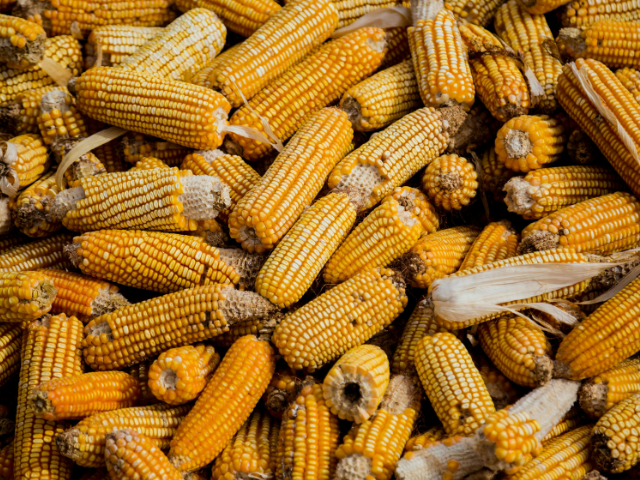
Climate change is affecting crop yields—this image of dried corn cobs. Farmers face crop challenges with unpredictable weather patterns and environmental stress. Photo by Livier Garcia on Pexels.
What You Need to Know
Have you ever noticed that certain fruits or vegetables seem harder to find at the grocery store—or that prices for some foods have gone up significantly? If so, you’re not alone. Climate change is reshaping the way we grow food, affecting where crops can thrive and making some foods more difficult to produce.
As global temperatures rise, extreme weather events become more common, and rainfall patterns shift, farmers worldwide are facing new challenges. Some crops may no longer be able to grow in areas where they have been farmed for generations. Others may start appearing in places where they were once impossible to grow.
Below, we’ll explore how climate change is impacting food production, what it means for global food diversity, and what steps we can take to ensure a stable food supply for the future.
Why Climate Matters for Our Food
Every plant has specific needs—some require warmth, others need cooler temperatures, and all depend on the right amount of water. Imagine a banana tree—it flourishes in warm, humid regions. Now think about wheat, which grows best in cooler, drier climates. These differences explain why certain foods are grown in specific parts of the world.
But as global temperatures rise, these conditions are changing. Some places are becoming too hot or too dry for traditional crops, while others are experiencing floods or unexpected frosts. These shifts are forcing farmers to rethink what they plant and where they plant it.
- More heat: Many crops, like rice and corn, have an upper temperature limit. Once it gets too hot, they stop growing.
- Unpredictable rainfall: Some areas are getting too much rain, while others face droughts, making it harder to maintain stable harvests.
- Soil changes: Rising temperatures and irregular rainfall can lead to soil degradation, making it harder to grow food in certain areas.
In short, climate change is making it more difficult to maintain the world’s current food production system.
The Problem – Crops Are Losing Their Homes
Scientists estimate that by 2100, up to 30% of global food crops could be growing in areas that no longer support them. The impact will be especially severe in low-latitude regions, which include parts of Africa, South Asia, and Latin America.
Take rice, for example—a staple food for billions of people. If global temperatures rise by just 2°C (3.6°F), 17% of current rice-growing areas may no longer be suitable for production. That means farmers in these regions could struggle to produce enough food, leading to higher prices and potential food shortages.
This problem isn’t just about one crop. Other key foods like coconuts, yams, cowpeas, and pigeon peas could also see 50% or more of their global production become unsustainable under 3°C warming.
For many farmers, this means tough decisions—either adapt to the new climate, switch to different crops, or move elsewhere. But for people in these regions who rely on farming for food and income, these choices are not easy.
Some Places Will Gain, Others Will Lose
While some regions are struggling, others may actually benefit from climate change—at least in the short term.
- North America and Europe could see an increase in food crop diversity as warming temperatures make it possible to grow foods that previously required warmer climates.
- For example, Canada and northern parts of the U.S. may become suitable for crops like peaches, figs, and even citrus fruits.
- Parts of Africa and South Asia may lose traditional crops like maize and coffee as conditions become too hot or dry.
But this shift isn’t as simple as it sounds. Just because a crop can grow in a new location doesn’t mean farmers are immediately ready to produce it. They need the right equipment, knowledge, and infrastructure to make the transition successful.
Additionally, pests and diseases that once affected crops in warmer climates may start appearing in new areas, making farming even more unpredictable.
Why Losing Crop Diversity is a Big Deal
A diverse food system is a strong food system. When farmers grow a variety of crops, it helps:
- Protect against crop failures: If one crop struggles due to drought or disease, others can still provide food and income.
- Support a stable food supply: Different crops provide different nutrients, ensuring balanced diets for communities.
- Strengthen ecosystems: Crop diversity can improve soil health, reduce pest outbreaks, and increase resilience to extreme weather.
Climate change is reducing crop diversity, especially in low-latitude regions. When fewer crops can grow in an area, food supplies become more vulnerable to disease, pests, and climate disasters.
For example, if a region depends heavily on one type of grain and that grain fails due to extreme heat, food prices can skyrocket, leaving many people without affordable options. This is why protecting crop diversity is essential for food security.
What Can Be Done?
While the challenges are real, there are ways to adapt and protect our food supply. Here’s how different groups can take action:
Farmers can adapt by:
- Growing heat-resistant and drought-tolerant crops.
- Using smarter irrigation systems to conserve water.
- Practicing crop rotation to keep soil healthy and improve resilience.
Scientists are helping by:
- Developing new crop varieties that can handle extreme weather.
- Improving soil management techniques to keep farmland productive.
- Researching alternative farming methods like vertical and hydroponic farming.
Governments and communities can support by:
- Creating policies that support sustainable farming and innovation.
- Investing in research and education for farmers.
- Helping farmers transition to new crops when necessary.
Consumers can make a difference by:
- Supporting local farmers: Buying locally grown food helps reduce the carbon footprint.
- Eating seasonal foods: This reduces the demand for crops that require excessive resources to grow in the wrong climate.
- Reducing food waste: Less waste means less pressure on global food production.
Every action, big or small, contributes to a more sustainable food future.
The Future of Food is in Our Hands
Climate change is already reshaping our food system. Some regions are struggling to maintain traditional crops, while others are seeing new opportunities. But without careful planning, food shortages, rising prices, and loss of diversity could threaten global food security.
The good news? There are solutions. Farmers, scientists, policymakers, and consumers all have a role to play in ensuring a resilient and diverse food supply for future generations.
So next time you’re at the grocery store, take a moment to think about where your food comes from. What if your favorite fruits and vegetables disappeared? What steps can you take today to support a more sustainable food future?
The choices we make now will shape the food we eat tomorrow.
Source: Heikonen, S., Heino, M., Jalava, M., Siebert, S., Viviroli, D., & Kummu, M. (2025). Climate change threatens crop diversity at low latitudes. Nature Food. https://www.nature.com/articles/s43016-025-01135-w?error=cookies_not_supported&code=4791b26a-7950-40df-9a19-33dc3e5ebeff


